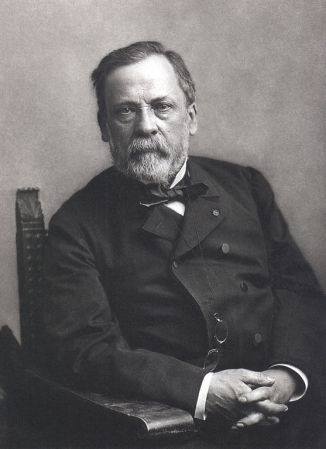
Louis Pasteur (click to enlarge)
Louis Pasteur (France, 1822-1895) Microbiologist and chemist. The germ theory of disease. Vaccination using weakened bacteria. Pasteurization. The cause of fermentation.
"A little science distances you from God, but a lot of science brings you nearer Him." [Louis Pasteur]
July 1879: Louis Pasteur was tired and frustrated. He had been trying for a long time to understand a disease called "chicken cholera," but nothing was working. Feeling worn out, he decided to take his usual Sunday break and head to his family home in Arbois.
Before leaving, he told his assistants to keep growing the chicken cholera microbes every 24 hours so the cultures wouldn’t get too old and die.
The job of keeping the cultures fresh was rotated between researchers. That Sunday, it was Charles Chamberland’s turn.
But the weather was hot, chicken cholera seemed like a hopeless case, and Chamberland loved fishing.
So instead of staying in the smelly lab on rue d’Ulm, he chose to spend the day by the Seine River.
Because of this, one culture of the bacteria was left sitting on a shelf for several days and wasn’t touched.
When Pasteur returned, he found the old culture and asked his team to inject some chickens with it.
The chickens got sick but, strangely, they didn’t die.
After a few days, they completely recovered.
Pasteur was surprised, and Chamberland quickly admitted that he had forgotten to refresh the culture the week before.
But Pasteur didn’t get angry. Instead, he was amazed—and even praised Chamberland.
Pasteur then had an idea: what if he injected those recovered chickens with a fresh, powerful version of the bacteria, the kind that usually kills chickens in just a few hours?
To everyone’s shock, the chickens stayed healthy.
Pasteur stood silently for a long moment while his assistants waited nervously. Then he suddenly shouted:
“Don’t you see? These animals have been vaccinated!”
He realized the bacteria had weakened while sitting out, likely due to exposure to oxygen, and had become less dangerous. But it was still strong enough to train the chickens’ bodies to fight off the real disease.
That old, forgotten culture had protected the chickens. Their immune systems had built a defense—even though the word “antibody” hadn’t even been invented yet.
Thanks to this lucky mistake, the French chickens were saved—and the world was one step closer to vaccines.
See Also
